16 minute read
The C.C.F
from Oct 1957
by StPetersYork
School grounds. Others watched and recorded the return of these bees to the Observation Hive in the Laboratory.
The concluding meeting before the examinations started was given by the Secretary, his subject being Microscopic Pond Life. It was the Society's first view of the newly acquired microprojector—a great advance on the old one for showing small organisms on the large screen.
Apart from the formal meetings we must record the great activity in the animal house under the sympathetic care of Gibson. He has been most patient and deserves our thanks. We cannot record everything, but the term's report would not be complete without mention of Black's pigeons, the arrival of the ferret family, the whereabouts of Adcock's mice, the beautiful budgerigars that Kirk very kindly brought, the axolotyl, the grass snakes and a host of others; with a special last word for "Jake", the young jackdaw who became so attached to us. Few had before experienced the remarkable associations of men and animals so well described by Konral Lorenz in his book "King Soloman's Ring".
C.C.F. NOTES
With the departure of C.S.M. Netherwood, C.P.O. Jose was appointed the Senior N.C.O. for the term. Drum Major Hancock lost no time in getting the Band together again and there were the usual spirited discussions on possible uniform changes. The result, however, was to leave the Band in khaki but add some more embellishments in the form of white gloves, braid and badges.
There was quite a large intake of new recruits.
Training very soon took on the usual form for the Summer Term with the emphasis on rifle and squad drill. The N.C.O. Cadre was well attended and it was not long before some of the more promising members were taken off to fill gaps in the N.C.O. establishment. Two special Weapon Training lectures were arranged for the Cadre, at the Depot, but it appeared that rather more interest and excitement was shown en route, over the introduction to "bicycle drill" (a relic of cavalry days), than the programme that had been arranged at the other end !
The Annual Inspection took place on Tuesday, 25th June, and this year, for the first time we believe, it was carried out by an officer of the Royal Marines—Major-General H. C. Fellowes, C.B.E., D.S.O. Everything went off very satisfactorily and the inspecting officers noted particularly the high standard of drill and steadiness on parade. The Band this year came in for special mention—their turn-out was meticulous and it was generally agreed that their performance was one of the most musical heard for many years. The N.C.O.s in
42
charge of training were confident and had obviously prepared their work thoroughly. The General, in his address, said that he was asking the Head Master for a special holiday for those in the C.C.F. in recognition of the fine effort that he had seen throughout the day.
As might be expected, the Fernie Cup Competition centred on the river. The narrative took the teams to a remote part of the world where they had to operate as versatile river patrols. They were issued with a considerable amount of equipment to fulfil their task— collapsible assault boats, wheeled trolleys, canoes, ropes, tackles and all the gear necessary to erect a 30 foot wireless mast. The construction of this mast was the culmination of a hazardous journey by land and water and was to be used to get a telephone line across the river. The enthusiasm shown by all teams was of a high order, but a little more anticipatory planning would have saved much misdirected energy ! The judges, operating from their special motor launch, had a hard task to follow the course of the competition. After the Drill Competition had been taken into consideration, Rise was placed first.
The term closed with the now traditional ceremony of "Sunset" to mark the end of Commemoration. In spite of an unfortunate break in the weather, the Band gave an excellent display of counter marching. A most fitting and quite unexpected epilogue brought everyone to a standstill—the sounding of the "Last Post" in the precincts of the School War Memorial, played so magnificently by the Senior Bugler, D. Anderson.
And so to Camp :- ARMY CAMP, 1957
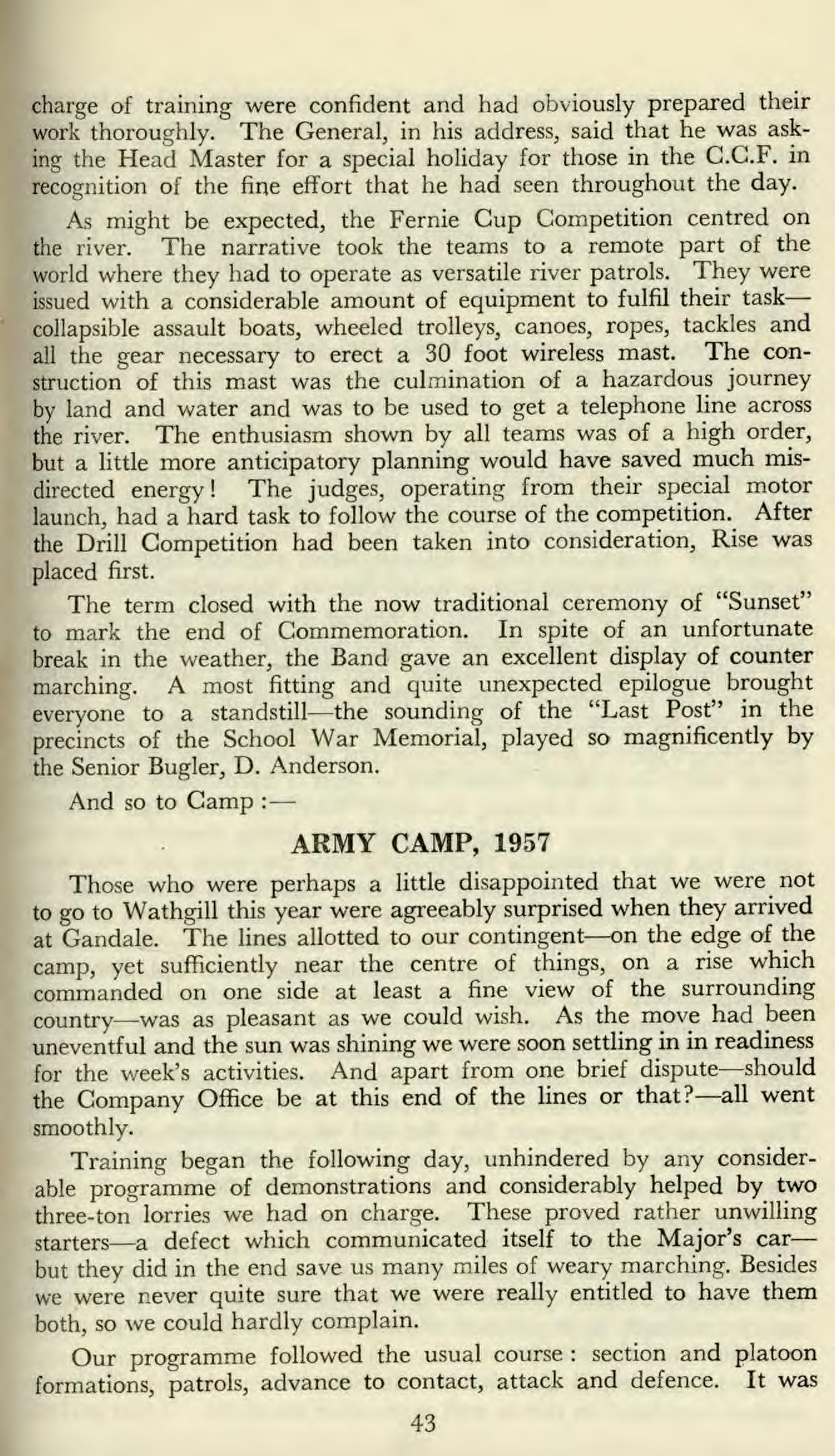
Those who were perhaps a little disappointed that we were not to go to Wathgill this year were agreeably surprised when they arrived at Gandale. The lines allotted to our contingent—on the edge of the camp, yet sufficiently near the centre of things, on a rise which commanded on one side at least a fine view of the surrounding country—was as pleasant as we could wish. As the move had been uneventful and the sun was shining we were soon settling in in readiness for the week's activities. And apart from one brief dispute—should the Company Office be at this end of the lines or that?—all went smoothly.
Training began the following day, unhindered by any considerable programme of demonstrations and considerably helped by two three-ton lorries we had on charge. These proved rather unwilling starters—a defect which communicated itself to the Major's car— but they did in the end save us many miles of weary marching. Besides we were never quite sure that we were really entitled to have them both, so we could hardly complain.
Our programme followed the usual course : section and platoon formations, patrols, advance to contact, attack and defence. It was 43
for many of us a familiar routine; but each exercise took us to some new area, and all was enlivened by the directing Major, roving over the battlefield with restless energy and leaving no one with the fond illusion that battles always follow any preconceived plan. Others too had their moments of self-realisation; not least Cadet Adams, authorised to wear his black jeans for a patrol demonstration, Cadets Franklin and Smart on the Lamp Exercise, and Capt. Le Tocq, alone with his rifle and a generous supply of ammunition, holding a whole company at bay.
A morning's exercise with blocks and tackle provided some relief from orthodox training. A rapid recce and Major Crews soon had two problems for us. The first involved the removal of a tree-trunk obstructing a pathway, and it was quickly and fairly efficiently solved, in spite of the derisive comments of the onlookers. The second, a river crossing, was tackled with much less speed and skill. It was indeed fortunate that only an imaginary chasm yawned beneath the swaying rope. Otherwise a good deal of tackle would have been written off. Nor would S.S.M. Clough, when unkindly kept suspended in mid-flight, have put such a brave face on his predicament.
The climax of training was of course the Night Exercise. This involved for the senior platoon a night bivouac in a remote part of the training area, and an attack next day on a uranium dump defended by the second platoon. Rain, the first of the week, added to the rigours of the exercise and cooking became almost impossible. Armstrong's section nevertheless mastered the conditions and managed to eat well, while most cadets had at least a hard-boiled egg before they moved off the following morning. Layfield, Kelly and Hemsley caused some anxiety during the night by losing themelves out on patrol, but they eventually re-appeared little the worse and were soon cheered by a warm snack in a local inn. Sgt. Cook commanded his platoon well, keeping a vigilant watch over the security of his bivouac; and he was perhas uplucky to be made a casualty by the umpires before the second phase began. This however gave Cpl. Beaumont his opportunity. He had already proved a cheerful leader in the dismal conditions of a wet early morning and he now led the approach march and launched his assault with impressive self-confidence. The exercise ended about eleven o'clock amid the usual din of blank, smoke and confusion, from which we all emerged thoroughly wet and tired. The return to camp was like the end of a campaign, each cadet handing in his kit to be carried home in bulk and emerging from the store-tent clad only in boots and a newly issued gas-cape.
The second platoon acquitted itself well in this exercise in its static and less interesting role, and if, as usual, the attackers were allowed to sweep through the defence, this was no reflection on the real strength of their positions. Their commander, Sgt. Macdonald, was unfortunate to be injured while leading a counter-attack in the last minutes of the exercise.
Some mention is also due to the Signallers under Lt. Hall who worked very hard on this as well as on other occasions. It was perhaps 44
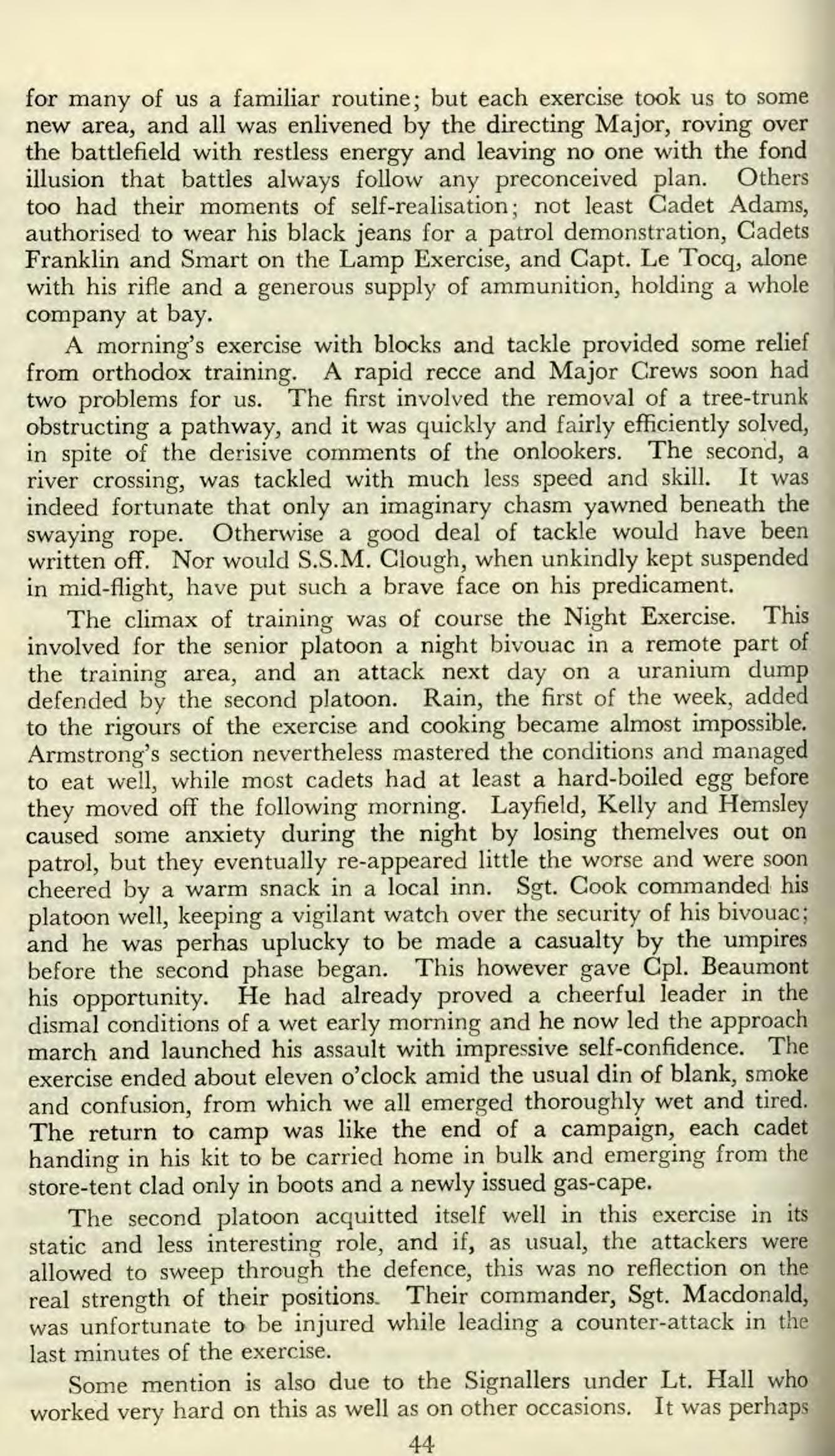
disappointing for them that the facilities they offered were not used to better advantage.
Demonstrations and competitions played rather a smaller part than usual this year. There was the usual impressive display of fire power and "duties of the army in aid of the civil power", which is now also a regular feature. We won the lines competition with the aid of Sgt.-Major Power and his mascot, Cadet Lambkin, a sheep's skull mounted on a pole. And we mounted quite an impressive guard. (Cadet Quin enjoyed himself whisking off cadets—from other units—into the Guard Room). But preparation for the final exercise prevented us from taking the seven-a-sides as seriously as we might otherwise have done. And there was no athletic meeting on the Sunday.
The R.A. detachment, who had been doing special training, left us on Friday for a trip to Otterburn where they fired the guns. The experience was well worth the rather long journey by "3 tonner".
Excellent service at mealtimes, good food, a trip to Whitby on Sunday afternoon also contributed to a successful camp. As usual however our main thanks are due to Major Crews, whom it is fitting we should mention this time as he was with us for the last time. Camp without Major Crews is difficult to imagine; and it is impossible to do justice to the part he has played in annual camps since the war, sometimes unaided. Countless cadets, even among those who may have grumbled at the time at what was asked of them, will long remember his fine example and inspiring leadership. We thank him once more for an excellent camp.
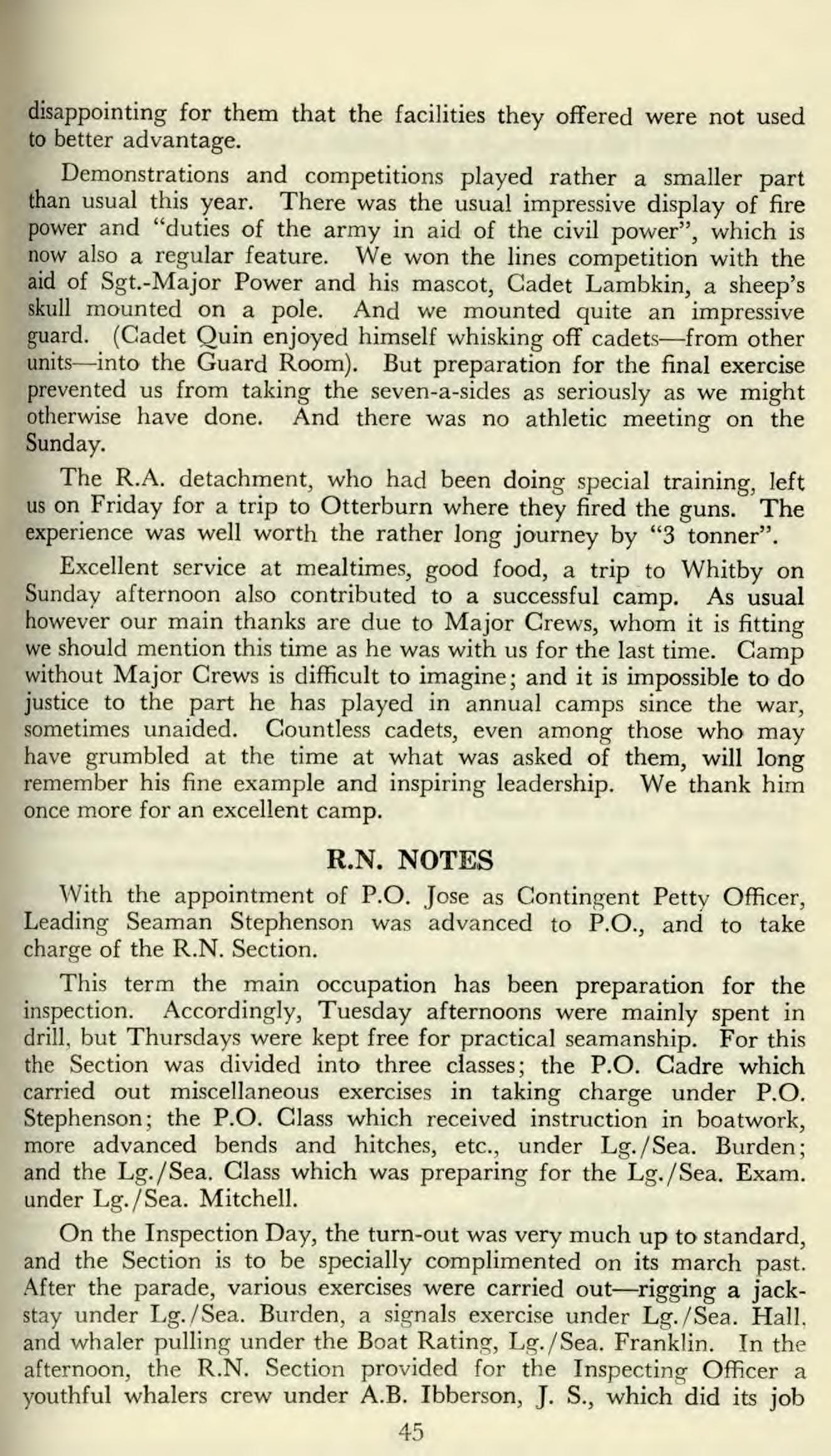
R.N. NOTES
With the appointment of P.O. Jose as Contingent Petty Officer, Leading Seaman Stephenson was advanced to P.O., and to take charge of the R.N. Section.
This term the main occupation has been preparation for the inspection. Accordingly, Tuesday afternoons were mainly spent in drill, but Thursdays were kept free for practical seamanship. For this the Section was divided into three classes; the P.O. Cadre which carried out miscellaneous exercises in taking charge under P.O. Stephenson; the P.O. Class which received instruction in boatwork, more advanced bends and hitches, etc., under Lg./Sea. Burden; and the Lg./Sea. Class which was preparing for the Lg./Sea. Exam. under Lg./Sea. Mitchell.
On the Inspection Day, the turn-out was very much up to standard, and the Section is to be specially complimented on its march past. After the parade, various exercises were carried out—rigging a jackstay under Lg. /Sea. Burden, a signals exercise under Lg./Sea. Hall. and whaler pulling under the Boat Rating, Lg./Sea. Franklin. In the afternoon, the R.N. Section provided for the Inspecting Officer a youthful whalers crew under A.B. Ibberson, J. S., which did its job 45
extremely well. After the inspection, School examinations prevented many further full parades, bu the Signals Exam. for Lg./Sea. candidates took place on the last Tuesday.
Considerable responsibility has been taken by senior members of the Section. Stephenson has shown initiative in the production of the weekly orders, and A.B. Jenkinson, the writer, has been most reliable in having them typed out and distributed. Burden and Franklin have both been towers of strength, the former looking after all signals and ceremonial round the mast, the latter taking full responsibility for the boats. The keenness on sailing in the Section is partly due to Franklin's own enthusiasm. Clark and Wheeler have been indefatigable in the stores, and also with the Basic Section.
R.N. CAMP This year the Camp was held at H.M.S. Thunderer which is the mi
Wednesday, 31st July, after spending an extra night at School, and arrived at Plymouth feeling rather warm and tired at 1825.
On reaching the R.N. College (Keyham) we were issued with No. 8's and oilskins and then, after a hot meal, were taken to the dormitories which held 5 or 6. We messed with the three other schools which were also undergoing training. For "Cooks", we divided up into four watches with a P.O. or Lg. hand in charge, who
also did "rounds" with the duty officer each night.
On the first day we went by bus to the R.M. Training Centre at Lympstone. Here we visited the ranges on the moors, where we were not only given demonstrations of infantry weapons, but were each allowed to fire a 2 in. Mortar and an anti-tank grenade ("Energa"), with its tremendous "kick". We were also taken round various obstacle
courses (in slow time) and later were allowed to fire sten and bren guns.
We were not disappointed by lack of sea time for we went out in H.M.S. Mutine, an ocean minesweeper. The senior hands went on the bridge for instruction by the officer of the watch, while the junior cadets took the helm.
One part of the programme which was excellent, was the sailing and boatwork. We had sailing experience in a 19 ton yacht, a gig,
cutters, a "Dragon", and in 14 ft. dinghies, and power boat experience
in an M.F.V. and a fast motor boat. Two forenoons and two afternoons were spent in this way.
On Sunday we attended the morning service at Manadon (the new college premises), which we were later to visit on a full tour of
inspection. On this latter occasion we visited the laboratories, the
workshops, the hangars, which contain examples of most of the aircraft used in the Fleet Air Arm. Each cadet was also given an article
to make in the workshops, and a most impressive collection of ashtrays, lamp standards, pokers, etc., were produced.
46
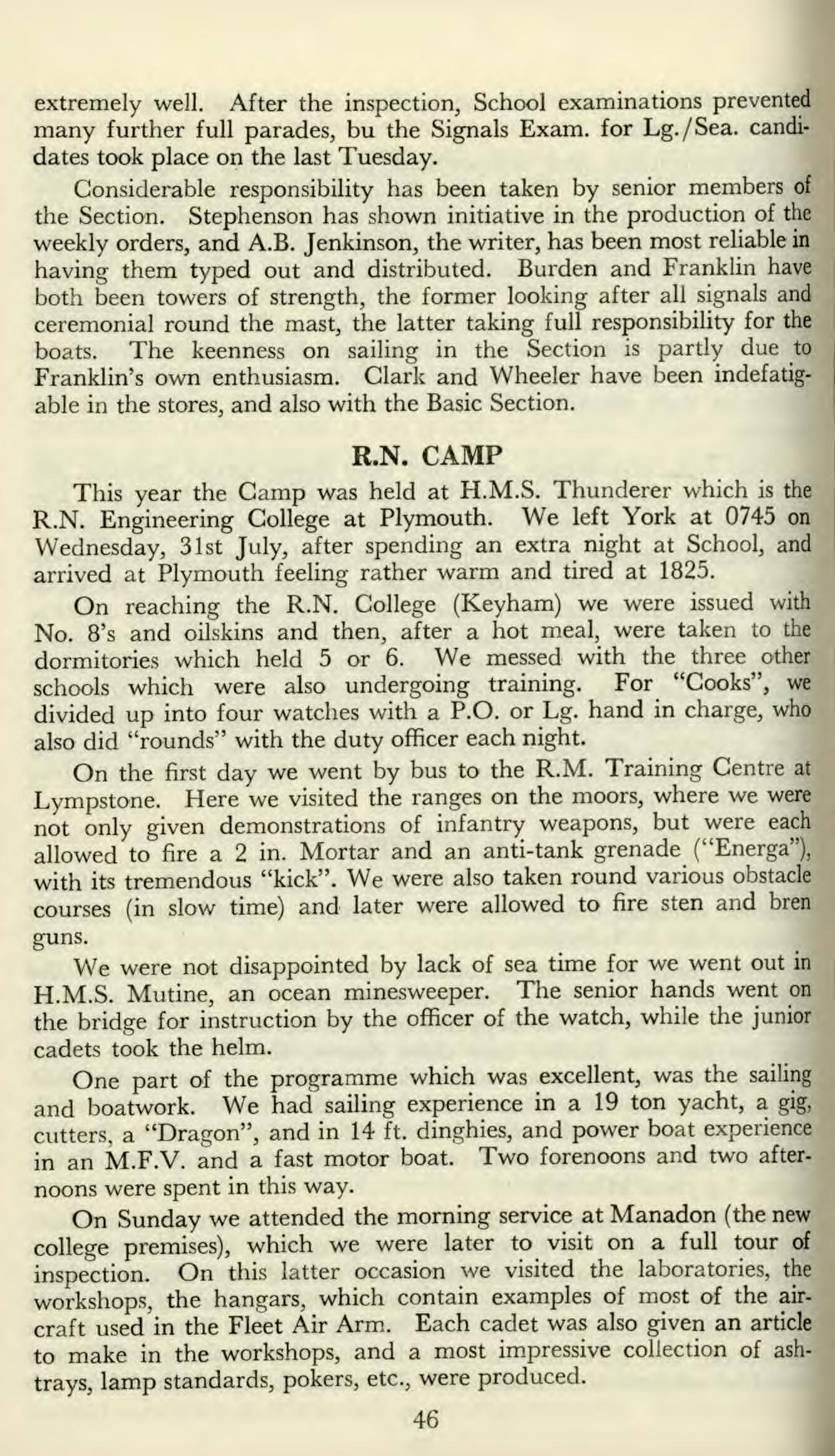
On the majority of evenings we had lectures and films on various naval topics, including submarines and the Fleet Air Arm.
By general consent, this was one of the best camps the Section has attended. We were well looked after at the college, and though we were disappointed when the flying was cancelled, the week's activities had been thoroughly enjoyed by all. Much of the credit for this goes to Lt.-Cdr. Lea, R.N., who had clearly spent so much time organising the course. T.G.S.
R.A.F. SECTION
Squadron Leader A. C. Shirreff, from Air Ministry, visited the School during the term, and interviewed those cadets who hope to go to Cranwell. It is worth noting here that the defence changes now taking place in no way reduce the prospects for a full career in the Royal Air Force for the man who can get into it on a regular basis. Entry to R.A.F. College, Cranwell, still offers the best future for the regular officer.
At the General Inspection in June, the R.A.F. Inspecting Officer expressed satisfaction with the appearance and training of the Section.
During the summer holidays, Cpls. Crowe and Thorp completed their flying training to "A" licence standard under the Flying Scholarship scheme. Flight Sergeant Brown, Leading Cadet Sutcliffe and Cadet Macpherson gained gliding certificates.
R.A.F. CAMP—CRANWELL
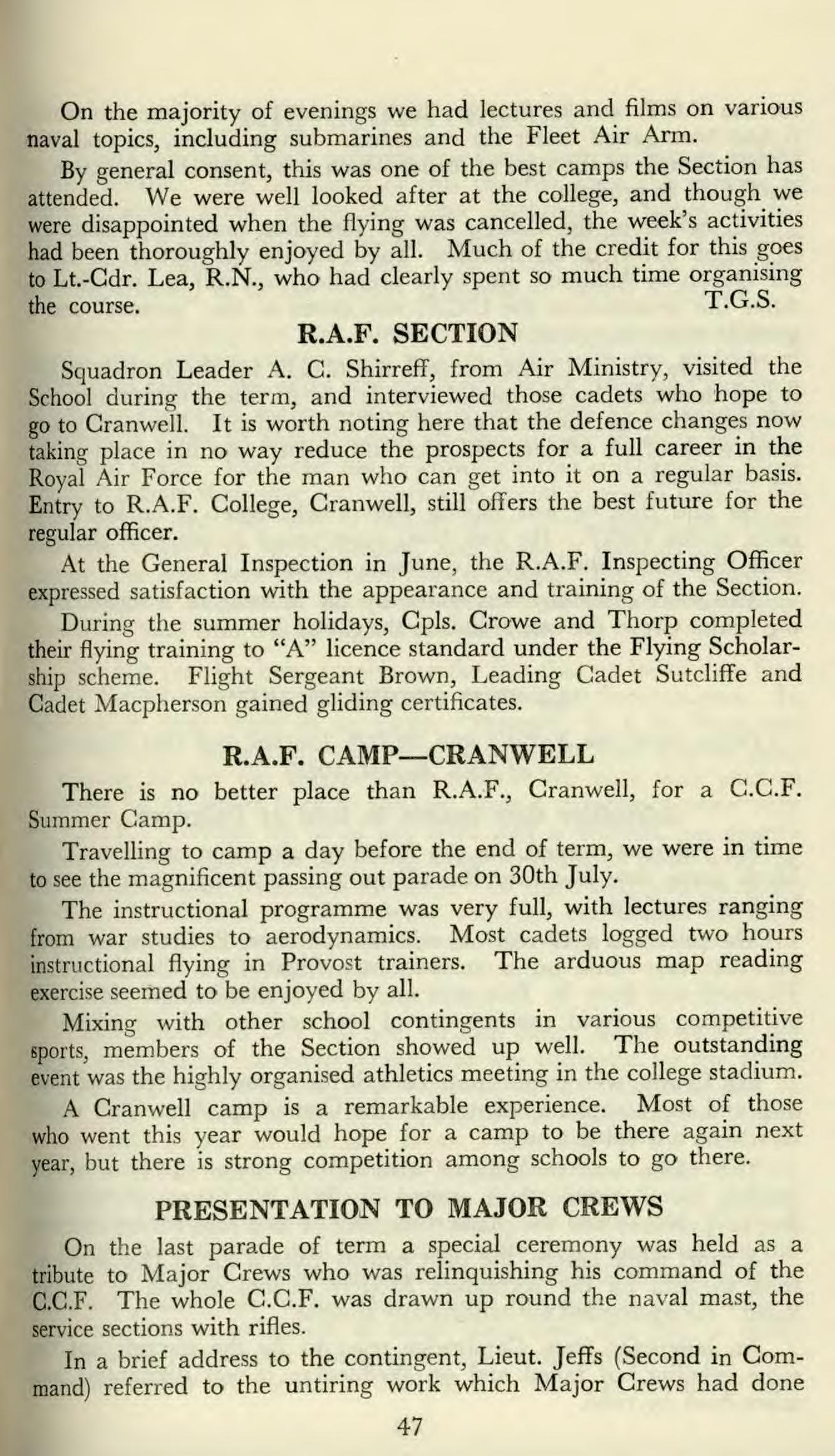
There is no better place than R.A.F., Cranwell, for a C.C.F. Summer Camp.
Travelling to camp a day before the end of term, we were in time to see the magnificent passing out parade on 30th July.
The instructional programme was very full, with lectures ranging from war studies to aerodynamics. Most cadets logged two hours instructional flying in Provost trainers. The arduous map reading exercise seemed to be enjoyed by all.
Mixing with other school contingents in various competitive sports, members of the Section showed up well. The outstanding event was the highly organised athletics meeting in the college stadium.
A Cranwell camp is a remarkable experience. Most of those who went this year would hope for a camp to be there again next year, but there is strong competition among schools to go there.
PRESENTATION TO MAJOR CREWS
On the last parade of term a special ceremony was held as a tribute to Major Crews who was relinquishing his command of the C.C.F. The whole C.C.F. was drawn up round the naval mast, the service sections with rifles.
In a brief address to the contingent, Lieut. Jeffs (Second in Command) referred to the untiring work which Major Crews had done 47
for the C.C.F. and to the very high standard of efficiency to which it had been raised under his command. Major Crews, he said, was a fine example of the type of leader which it was the chief function of the C.C.F. to produce.
On behalf of the C.C.F., C.P.O. Jose then made a presentation to Major Crews of an inscribed Table Lighter (a portrait of H.M. the Queen by Annigoni, also to be presented, was still in preparation). After the presentation the C.C.F. was called to the "present" and a general salute was given.
In reply Major Crews thanked the C.C.F. for the honour which it had done him by the special parade and for the presentation. He felt that the high standard of the C.C.F. was due to the loyalty and hard work of all officers, N.C.O.s and cadets who had been under his command.
He said that he was leaving with much regret as he had great faith in the C.C.F. He had been most proud to serve in the unit since 1938 and wished it every success in its future.
The short ceremony was ended by the hoisting of a signal wishing Major Crews the best of luck in the future.
(Taken from the Norfolk and Suffolk Journal and Diss Express, of 30th August, 1957) Schoolboy flier landed in field at Palgrave
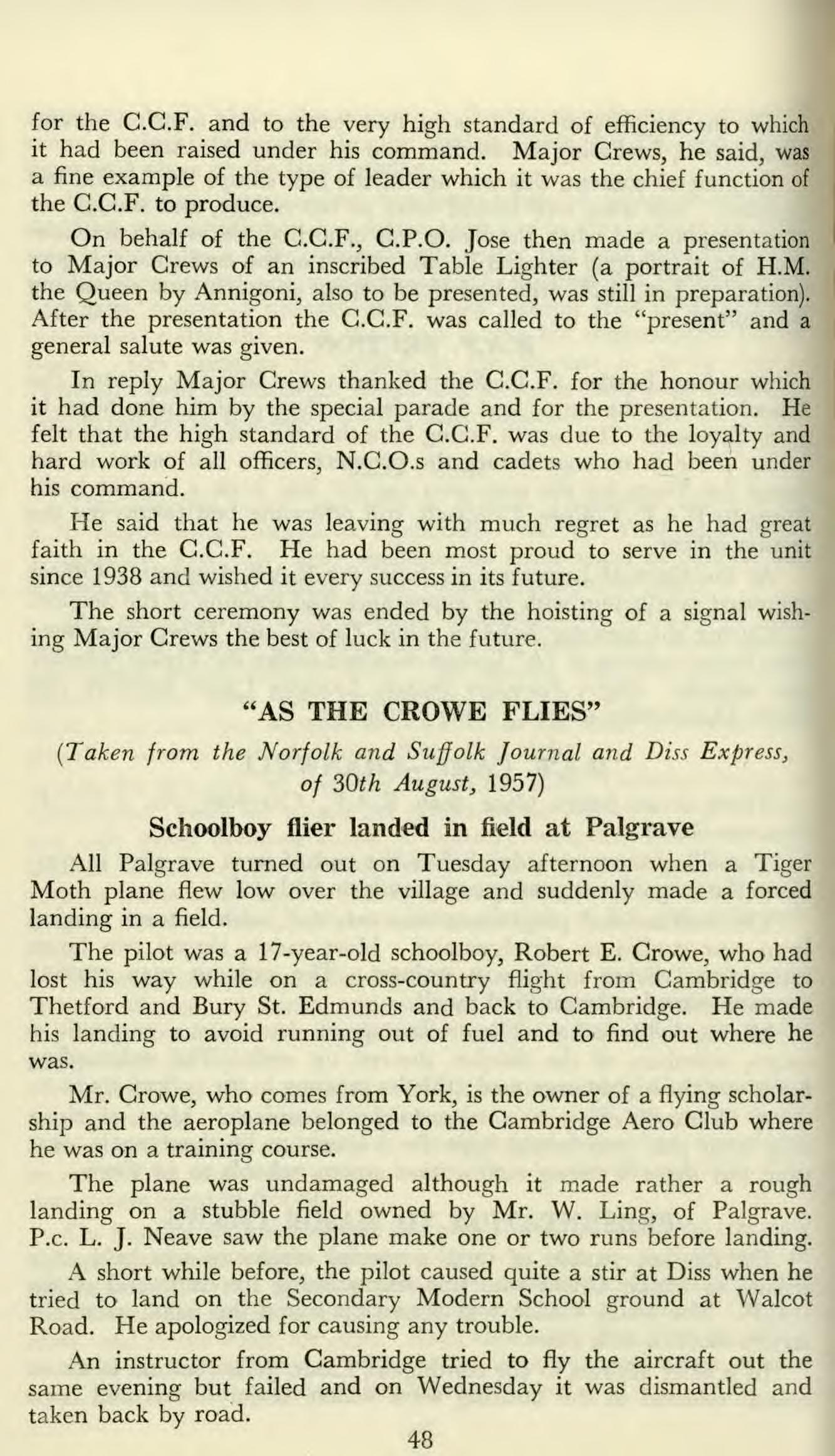
All Palgrave turned out on Tuesday afternoon when a Tiger Moth plane flew low over the village and suddenly made a forced landing in a field.
The pilot was a 17-year-old schoolboy, Robert E. Crowe, who had lost his way while on a cross-country flight from Cambridge to Thetford and Bury St. Edmunds and back to Cambridge. He made his landing to avoid running out of fuel and to find out where he was.
Mr. Crowe, who comes from York, is the owner of a flying scholarship and the aeroplane belonged to the Cambridge Aero Club where he was on a training course.
The plane was undamaged although it made rather a rough landing on a stubble field owned by Mr. W. Ling, of Palgrave. P.c. L. J. Neave saw the plane make one or two runs before landing.
A short while before, the pilot caused quite a stir at Diss when he tried to land on the Secondary Modern School ground at Walcot Road. He apologized for causing any trouble.
An instructor from Cambridge tried to fly the aircraft out the same evening but failed and on Wednesday it was dismantled and taken back by road.










